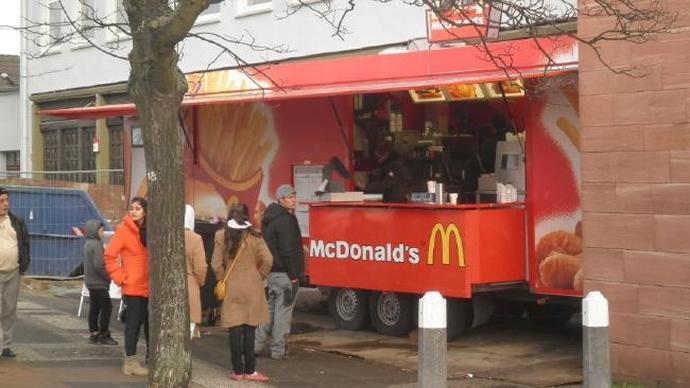|
INTERNATIONAL -- The global company has already launched food trucks in America and some countries in Europe, where mobile restaurants serve burgers and fries through a classic drive-through window.
Also read, Food trucks in Montreal face too many regulatory roadblocks. In the US, the company annouced last year it would drive 12-metre trucks to sports games, festivals and cul-de-sacs throughout the country. In Poland and Germany, the familiar red and yellow brand can be seen at outdoor squares. McDonald’s Australia has denied plans are afoot to take the iconic restaurant mobile, however some experts think it would be a great idea for the company. Francis Loughran, managing director at food and hospitality consultancy company Future Food, said it would be a smart business move. “McDonald’s will follow the trend. In the late 80s we saw McDonald’s gravitating towards cafes as it saw people were moving towards coffee and baked items like muffins and sandwiches,” he said. “McDonald’s introduced McCafe and what they were doing was following the world trend of cafe latte society. It’s the same now with food trucks. They have credibility and McDonald’s is seeing a trend, not a fad, that is both credible, profitable, social and has wide market appeal. “McDonald’s will know what its 10 bestsellers are and will reduce the menu down to what they can to put in a food truck.” Mr Loughran said the move would keep the company up to date with modern day trends and habits to remain competitive. Mr Loughran did not think the fast food giant moving into the mobile market will kill the charm of food trucks, which has predominantly been taken up by small eateries with unique dishes. “It will just be an extension of McDonald’s and will pop up at events. McCafe didn’t affect the cafe market,” he said. “This is just another avenue to serving their customers. “It’s a good business decision for them, it gives them exposure, for example, at a football stadium or at parks in Melbourne and Sydney as is becomes part of the mobile world. “Food trucks add a new dimension to food and comes to you when you want to enjoy it at entertainment or sporting events, and food trucks have aligned themselves very well with technology.” But not everyone is convinced. Senior social scientist at the University of Melbourne, Dr Lauren Rosewarne, told news.com.au fast food giants would find it harder to succeed in the food truck market than smaller eateries. “Our hyper-individualism — illustrated well with our laundry list of dairy-free, gluten-free, paleo, superfood-fortified personalised food demands — means that buffet style venues and mass-production fast food chains can’t adequately meet our changing needs the way more niche venues can,” she said. “We’ve become a bit fickle with our tastes. The idea of pop-up restaurants and food trucks thus enables our fetishes for pulled pork or chickpea juice meringues to be exploited at a relatively low cost — small businesses are more nimble and more easily able to adapt their offerings to meet trends. Fast food chains can’t do this. It is difficult and costly for them to adapt their offerings to meet flash-in-the-pan culinary trends.” SOURCE Olivia Lambert and Benedict Brook, news.com.au
0 Comments
Leave a Reply. |
Advertisement
News & Updates
Stay informed with the latest news around foodservice, agriculture and other related food news. Advertisement Opportunities
|


 RSS Feed
RSS Feed


